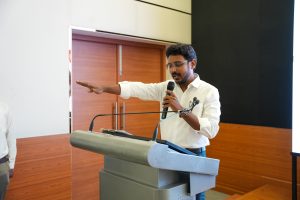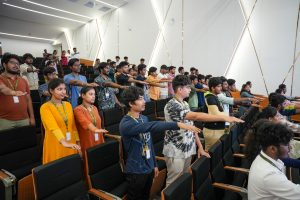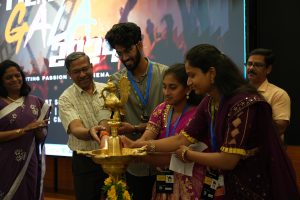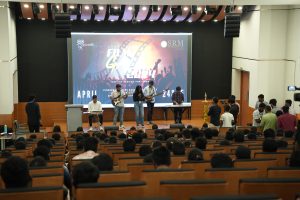Groundbreaking Research on Optimal Routing Protocol in IEEE Sensors Journal
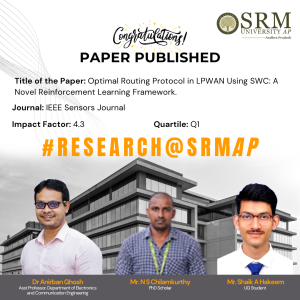 In a significant academic achievement, Dr Anirban Ghosh, Assistant Professor from the Department of Electronics and Communication Engineering along with Mr Naga Srinivasarao Chilamkurthy, PhD Scholar, and Mr Shaik Abdul Hakeem, an undergraduate student, have made a remarkable contribution to the field of communication engineering. Their paper, titled “Optimal Routing Protocol in LPWAN Using SWC: A Novel Reinforcement Learning Framework,” has been published in the esteemed IEEE Sensors Journal, with an impressive impact factor of 4.3.
In a significant academic achievement, Dr Anirban Ghosh, Assistant Professor from the Department of Electronics and Communication Engineering along with Mr Naga Srinivasarao Chilamkurthy, PhD Scholar, and Mr Shaik Abdul Hakeem, an undergraduate student, have made a remarkable contribution to the field of communication engineering. Their paper, titled “Optimal Routing Protocol in LPWAN Using SWC: A Novel Reinforcement Learning Framework,” has been published in the esteemed IEEE Sensors Journal, with an impressive impact factor of 4.3.
This publication marks a milestone for the university and highlights the innovative research being conducted by its faculty and students. The paper delves into the development of an optimal routing protocol for Low-Power Wide-Area Network (LPWAN) using State-Wise Communication (SWC), employing a novel reinforcement learning framework to enhance network efficiency and performance.
This work will pave the way for advancements in LPWAN technologies, which are crucial for the Internet of Things (IoT) ecosystem. The university community celebrates this achievement and looks forward to the positive impact it will have on technology and society.
Abstract:
Low Power Wide Area Network (LPWAN) has emerged as a dominating communication technology that offers low-power and wide coverage for the Internet of Things (IoT) applications. However, the direct data transmission approach has a limited network lifetime. Even multi-hop data transmission experiences several difficulties including high data latency, poor bandwidth utilization, and reduced data throughput. To overcome these challenges, in this paper, a recent breakthrough in social networks known as Small-World Characteristics (SWC) is incorporated into LPWANs.
In particular, in this work, Small-World LPWANs (SW-LPWANs) are developed by using the Reinforcement Learning (RL) technique and using different node centrality measures like degree, betweenness, and closeness centrality. Further, the performance of the developed SW-LPWANs is evaluated in terms of energy efficiency (alive/dead devices, and network residual energy) and Quality-of-Service (average data latency, data throughput, and bandwidth utilization), and is compared with that of conventional multi-hop LPWAN. Finally, to validate the simulation results, similar analyses are performed on the real-field LPWAN testbed.
The obtained simulation results confirm that SW-LPWAN developed by the RL method performs better than other techniques, with 11% more alive devices, 5.5% higher residual energy, 2.4% improved data throughput, and 14% efficient bandwidth utilization compared to the next best method. A similar trend is observed with real-field LPWAN testbed data also.
Explanation of the Research in Layperson’s Terms
Social networks primarily revolve around establishing human connections, whereas LPWANs are designed for connecting IoT devices that have limited battery-driven power. In this context, the smart devices must communicate in an IoT setting to conserve the limited energy available to them. To achieve this, the concept at the core of social networking also known as small world characteristic is incorporated into LPWAN using the Q-learning technique.
Practical Implementation or the Social Implications of the Research
IoT applications such as remote healthcare, smart environmental monitoring, asset tracking, and smart traffic systems require low transmission delay and high network lifetime. The proposed research helps in achieving the above parameters.
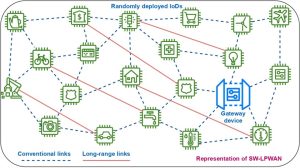
Collaborations
Dr Om Jee Pandey, Assistant professor Department of Electronics Engineering, Indian Institute of Technology, (BHU), Varanasi. e-mail: omjee.ece@iitbhu.ac.in
Dr Linga Reddy Cenkeramaddi, Professor, Department of Information and Communication Technology, University of Agder, Norway. e-mail:linga.cenkeramaddi@uia.no
Future Research Plan
In the next phase of research, we will be interested in investigating how the energy efficiency and other quality of service of smart devices in an IoT setting can be improved if they are partially or completely mobile.
- Published in Departmental News, ECE NEWS, News, Research News
Unlocking Cholesterol Homeostasis: A Mathematical Modelling Perspective
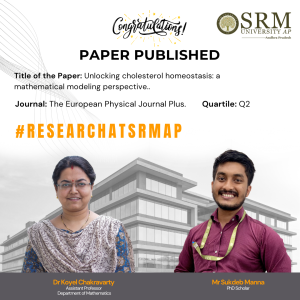 In a significant stride towards understanding cholesterol homeostasis, Dr Koyel Chakravarty, Assistant Professor and Mr Sukdeb Manna, a PhD Scholar in the Department of Mathematics has co-authored a paper titled “Unlocking Cholesterol Homeostasis: A Mathematical Modelling Perspective.” The paper has been published in the esteemed journal, The European Physical Journal Plus, with an impact factor of 3.4. This collaborative effort showcases the innovative application of mathematical modelling in unravelling the complexities of cholesterol regulation within the body.
In a significant stride towards understanding cholesterol homeostasis, Dr Koyel Chakravarty, Assistant Professor and Mr Sukdeb Manna, a PhD Scholar in the Department of Mathematics has co-authored a paper titled “Unlocking Cholesterol Homeostasis: A Mathematical Modelling Perspective.” The paper has been published in the esteemed journal, The European Physical Journal Plus, with an impact factor of 3.4. This collaborative effort showcases the innovative application of mathematical modelling in unravelling the complexities of cholesterol regulation within the body.
The research not only contributes to the existing body of knowledge in this field but also sheds light on potential avenues for further exploration and understanding. Dr Chakravarty and Mr. Manna’s work underscores the importance of interdisciplinary approaches in scientific research and highlights SRM University-AP’s commitment to fostering cutting-edge research and innovation.
Their collaborative efforts serve as an inspiration to aspiring researchers and underscore the university’s dedication to pushing the boundaries of knowledge and discovery. Congratulations to Dr Chakravarty and Mr Manna on this remarkable achievement, and we look forward to more groundbreaking contributions from them in the future.
Abstract:
Limited progress in the mathematical modelling of cholesterol transport systems is hampering novel therapeutic interventions. This issue is addressed by the present study through precise design, employing four compartmental models to elucidate cholesterol dynamics in the comprehensive bloodstream. Disparities in medical advancements, particularly in cholesterol-related pathophysiology, are aimed to be bridged, advancing medical science and patient care outcomes.
Therapeutic strategies for reducing blood cholesterol are explored by the model, with parameter influences on equilibrium stability revealed through sensitivity analysis. System parameters are effectively manipulated by imposing sensitivity analysis, and pinpointing areas for model refinement. Stability analysis contributes to diverse realistic models, confirming local asymptotic stability. Model efficacy in studying cholesterol transport dynamics is supported by analytical and numerical assessments. The study concludes with the present model validation to substantiate it by comparing the present outcomes with the existing ones.
Explanation of The Research in Layperson’s Terms:
Basically, scientists are having trouble figuring out how to model how cholesterol moves around in the body, which is important for developing new treatments. This study tries to solve that problem by creating detailed models that show how cholesterol behaves in different parts of the bloodstream. The goal is to bridge the gap in medical knowledge about cholesterol-related problems and improve how we treat patients. The models help us understand how different treatments might affect cholesterol levels, and by analyzing them closely, we can figure out which factors are most important. This lets us tweak the models to make them more accurate. The study shows that the models are reliable by testing them both analytically and numerically, and comparing the results to what we already know.
Practical Implementation or the Social Implications of the Research
1. Personalized Medicine: The mathematical models developed in this research could help in designing personalized treatment plans for individuals with high cholesterol levels. By understanding how different factors affect cholesterol dynamics, doctors can tailor therapies to each patient’s specific needs, leading to more effective and targeted treatments.
2. Drug Development: Pharmaceutical companies could use these models to screen potential drugs for lowering cholesterol. By simulating how different compounds interact with cholesterol transport systems, researchers can identify promising candidates for further testing, potentially speeding up the drug development process.
3. Healthcare Cost Reduction: Better understanding of cholesterol dynamics could lead to more efficient use of healthcare resources. By optimizing treatment strategies and preventing complications related to high cholesterol, healthcare costs associated with conditions like heart disease could be reduced, benefiting both individuals and society.
4. Public Health Initiatives: Insights from the research could inform public health initiatives aimed at reducing cholesterol-related diseases. For example, policymakers could use the models to design targeted interventions such as education campaigns promoting healthy lifestyle choices or policies to improve access to cholesterol-lowering medications.
5. Improved Patient Outcomes: Ultimately, the goal of this research is to improve patient outcomes by better understanding and managing cholesterol homeostasis. By developing more accurate models of cholesterol transport dynamics, healthcare providers can make more informed decisions, leading to better control of cholesterol levels and reduced risk of cardiovascular disease and other related conditions.
Future Research Plans:
1. Current models may focus on a limited set of factors influencing cholesterol transport. Future research could explore the integration of additional biological factors such as genetic variations, hormonal influences, and dietary components into the models to create a more comprehensive understanding of cholesterol homeostasis.
2. Most existing models of cholesterol transport assume static conditions. Future research could develop dynamic models that capture the time-dependent changes in cholesterol levels in response to various stimuli, such as meals, physical activity, and medication intake. Dynamic models would provide a more accurate representation of real-world cholesterol dynamics and enable the evaluation of time-sensitive interventions.
Picture Related to the Research
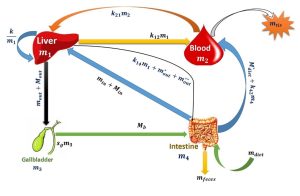
- Published in Departmental News, Math News, News, Research News
#NoExcusesDay: Promoting Voter Awareness and Responsibility
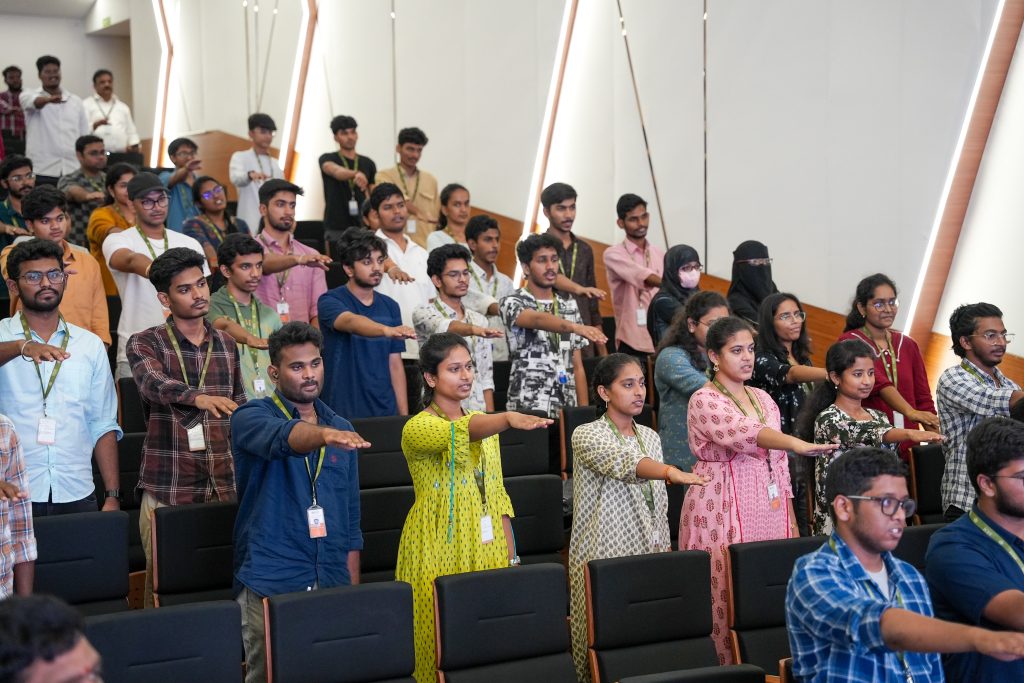
On the auspicious occasion of advocating for voter awareness and responsibility, a “#NoExcusesDay” event was held at SRM University-AP on May 09, 2024, organised by the Times of India and the Directorate of Communications of the university. The event, graced by Chief Guest, Mr Harendhira Prasad, Additional Chief Electoral Officer, aimed to emphasise the significance of voting in a democracy and to motivate citizens, especially the youth, to exercise their right to vote without fail.
The event commenced with the display of a motivating video message from President Draupadi Murmu, setting the tone for the importance of active participation in the electoral process. Highlighting the statistics of voting percentages in assembly elections from Hyderabad, the video presentation was followed by an address by Mr Rajiv Kumar, the Chief Election Commissioner, who underscored the importance of adding 97 crore voters to the electoral rolls.
The introduction of technology in the electoral process was a key point of discussion, with emphasis placed on the utilisation of advanced methods to ensure smooth and efficient polling. The staggering number of 10.5 lakh polling stations across the nation further underscored the magnitude of the electoral process.
Under the theme “Chunav Ka Parv Desh Ka Garv” (Festival of Elections, Pride of the Nation), the event witnessed active participation from students and faculty members alike. Mr Pankaj Belwariar, Director of Communications, and Mr Anil Nigam, Director of Student Affairs, graced the stage to extend their support and encouragement towards fostering a culture of voting. The event also provided a platform for students to share their first-time voting experiences. M. Kartika, Y. Ramya, V. Suma, and Tamineni Harnan Reddy shared their personal anecdotes, underscoring the sense of responsibility and empowerment that comes with casting a vote.
Mr Pankaj Belwariar’s impassioned speech resonated with the audience as he articulated the significance of treating voting as a non-negotiable duty. His “no-excuse day” message struck a chord, urging individuals to overcome obstacles and prioritise their democratic duty. Mr Anil Nigam elaborated on the disparities between rural and urban voting patterns, highlighting the heightened enthusiasm observed in rural areas. Aditya Challa, a fourth-year student, emphasised the symbiotic relationship between voting and the right to question, asserting, “No vote, no right to question.”
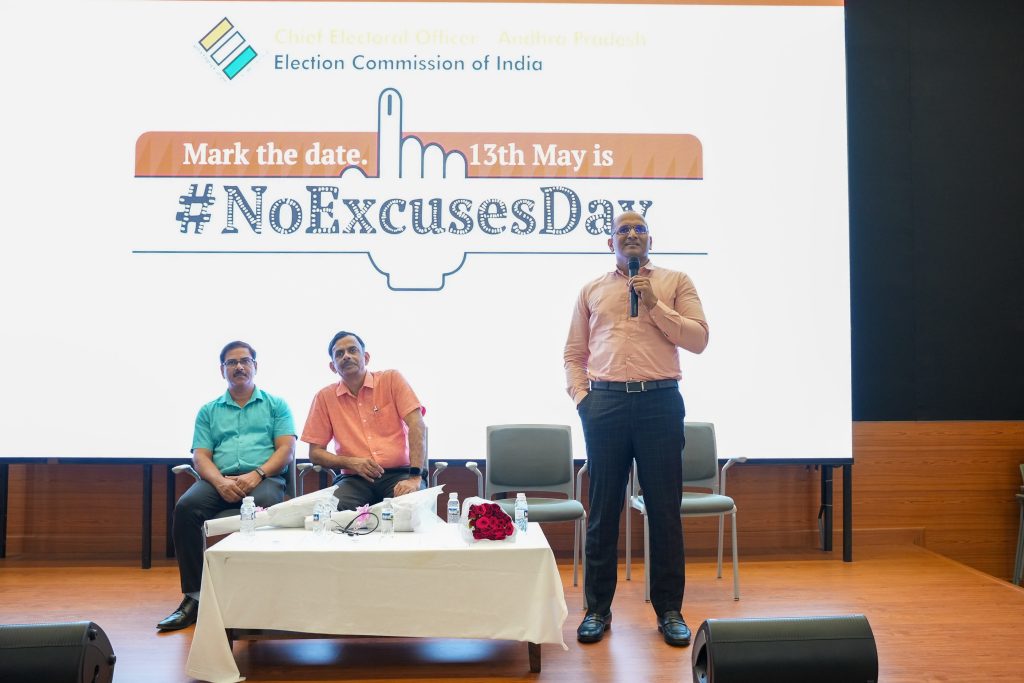
The event reached its pinnacle with the chief guest, Mr Harendhira Prasad’s speech, where the imperative nature of May 13th, termed as “D-day” for both assembly and Lok Sabha elections, was underscored. Stressing the importance of carrying approved identification cards for casting votes, the chief guest reiterated that voting is not just a right but a solemn duty that every citizen must fulfil.
The significance of the None of the Above (NOTA) option was elucidated, serving as a powerful tool for citizens to express dissent and demand accountability from political parties. The chief guest, Mr Harendhira Prasad, made a humble request for citizens to fulfil their duty with the same diligence as those involved in organising the elections, resonating deeply with the audience.
In conclusion, the event served as a poignant reminder of the privileges and responsibilities inherent in a democratic society. Through informative sessions, personal anecdotes, and impassioned speeches, attendees were galvanised to embrace their role in shaping the future of the nation through the simple yet profound act of voting. As May 13, 2024 approaches, the call to action reverberates loud and clear: no excuses, only votes.
- Published in News
Film Gala 2024: A Spectacular Showcase of Talent and Creativity
 On April 24-25, 2024, the much-anticipated Film Gala 2024 unfolded by SRM University-AP’s Cinemates Club, under the Directorate of Student Affairs, igniting the creative fervour of budding filmmakers from universities across India. This exhilarating event provided a vibrant platform for these talented individuals, budding to exhibit their cinematic prowess.
On April 24-25, 2024, the much-anticipated Film Gala 2024 unfolded by SRM University-AP’s Cinemates Club, under the Directorate of Student Affairs, igniting the creative fervour of budding filmmakers from universities across India. This exhilarating event provided a vibrant platform for these talented individuals, budding to exhibit their cinematic prowess.
Graced by the presence of esteemed Tollywood actor Satya Dev and actress Archana as chief guests, the event was a star-studded affair filled with entertainment and enlightenment. Attendees were treated to mesmerizing dance performances, soulful music, engaging discussions, pulsating DJ sets, and a celebration of artistic brilliance that left everyone inspired.
The atmosphere at the Gala was electric, as aspiring filmmakers seized the opportunity to have their talents acknowledged and applauded. The Film Gala hosted an array of thrilling competitions, each pushing the boundaries of creativity:
- Cineverse: Where Stories Unfold: A short film competition that transported audiences through captivating narratives.
- Snake and Ladders: A playful twist on storytelling where every move leads to unexpected turns.
- Plot Saga: Your Journey With Scripts: A celebration of the art of scriptwriting, where imagination knew no bounds.
- Trailer Trek: Filmmakers raced against the clock, crafting gripping trailers that left viewers craving more.
- Cinerythm: Western dance took centre stage, with both group and solo performances.
- Character Canvas: Participants embodied iconic movie characters, showcasing their versatility.
- Galasymphony: The spotlight shifted to melodious voices in a spirited singing competition.
- Visual Fable: Every frame held a story, as participants created videos based on a central theme.
- Movie Night: A cinematic feast under the stars, where films came alive on the big screen.
- Cinematography Workshop: Aspiring cinematographers honed their skills, learning from industry experts.
The Film Gala was more than an event; it was a celebration of artistic brilliance. Aspiring filmmakers seized the opportunity to have their work recognized and appreciated. Their passion and dedication illuminated every corner of the venue, leaving an indelible mark on the cinematic landscape. Congratulations to the organisers, participants, students and everyone who contributed to making the Film Gala 2024 an unforgettable success!
- Published in News, student affairs news


